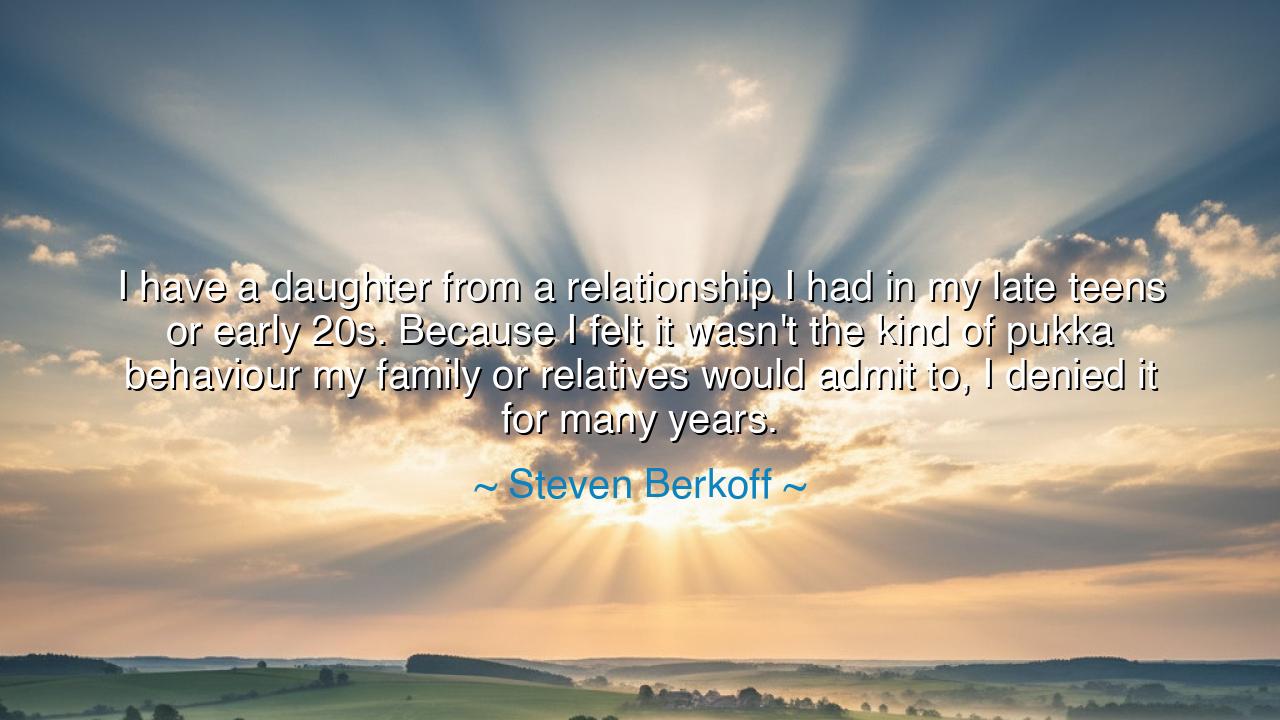
I have a daughter from a relationship I had in my late teens or
I have a daughter from a relationship I had in my late teens or early 20s. Because I felt it wasn't the kind of pukka behaviour my family or relatives would admit to, I denied it for many years.






The actor and dramatist Steven Berkoff once confessed with heavy candor: “I have a daughter from a relationship I had in my late teens or early 20s. Because I felt it wasn’t the kind of pukka behaviour my family or relatives would admit to, I denied it for many years.” In these words lies not only a personal tale, but a timeless lesson on shame, secrecy, and the struggle between truth and reputation. For the weight of family expectation can be more crushing than chains, and the fear of judgment can silence even the deepest realities of the heart.
The relationship he speaks of, born in the fervor of youth, produced life—his daughter, flesh of his flesh, a living testament of love and error intertwined. Yet instead of celebrating this gift, he cloaked it in denial, not because the child was unworthy, but because the world around him demanded an image of pukka behaviour—that rigid mask of respectability upheld by kin and society. Herein lies the tragedy: when honor is defined by appearances, truth itself is cast aside.
To deny what is sacred out of fear of scorn is a torment the soul cannot escape. Though his lips concealed his daughter, his conscience bore her name unspoken, echoing through the hidden chambers of memory. Such denial is not mere forgetfulness, but a wound inflicted upon the self—a betrayal of blood, born not of malice but of weakness before the laws of men.
Yet in confession, Berkoff reclaims his humanity. By speaking openly of his denial, he unmasks the tyranny of false respectability, showing that true honor lies not in conforming to society’s gaze, but in embracing the truth of one’s life. The act of admission becomes redemptive, transforming past silence into present courage.
So let this lesson endure: never allow the fear of family judgment or the hunger for appearances to rob you of truth. A child, a relationship, a mistake, or a triumph—these are all threads of the same tapestry, woven by the hand of destiny. To deny them is to unravel the fabric of the self; to claim them is to walk in strength. And though confession may come late, it carries the power to free both the heart and the generations that follow.






YLYen Loan
Steven Berkoff’s words are powerful because they speak to the universal struggle of balancing personal choices with family and societal expectations. Denying something as significant as fatherhood highlights the pressure to conform. How many people hide their truth to avoid disapproval? What if we could shift the narrative and encourage more people to embrace their stories, free of shame, and focus on personal growth rather than societal validation?
Jjeondtkvy
Berkoff’s reflection on denying his daughter because of societal judgment is a stark reminder of the burdens we carry to meet the ‘right’ standards. It makes me wonder—how much of our past are we willing to ignore or suppress just to appear perfect in the eyes of others? Can we ever truly be ourselves if we live in constant fear of others’ expectations? How do we reconcile our authentic selves with the roles others want us to play?
STQuynh Nhi 10 su Tran
This quote sheds light on the guilt and shame that can come with societal expectations. Berkoff’s experience reminds me of how powerful the fear of judgment from family can be. How often do we sacrifice our authenticity to conform to social norms? How can we break free from these pressures and embrace our past decisions, no matter how they may have been perceived by others?
PTPhat Tan
Berkoff’s admission is relatable and thought-provoking. It’s interesting how we sometimes let family or societal expectations dictate our actions, even when it comes to something as personal as parenthood. It makes me question how many of us are truly free to live authentically without fear of rejection. Shouldn’t our past choices, even mistakes, be something to learn from rather than hide?
NTNgoc Trang
This quote highlights the complexity of family dynamics and personal identity. Berkoff mentions denying the relationship because it wasn’t deemed acceptable by his family, which makes me wonder—how often do we hide parts of ourselves due to fear of judgment? Is the need to meet societal expectations stronger than the need to accept and embrace our own life choices? How can we shift the narrative to reduce this pressure?